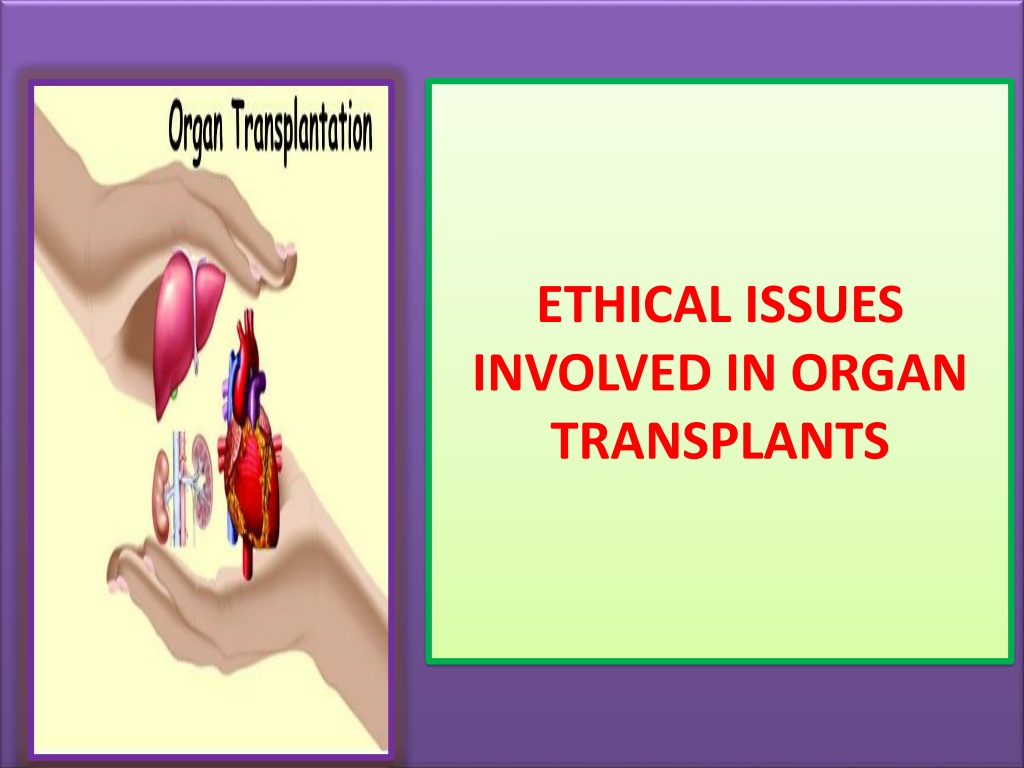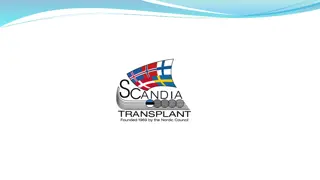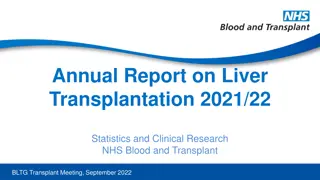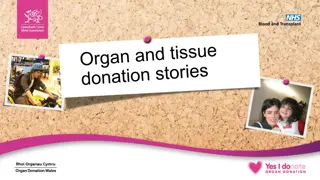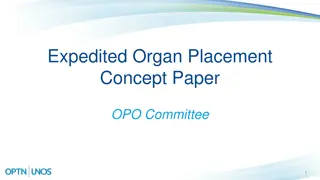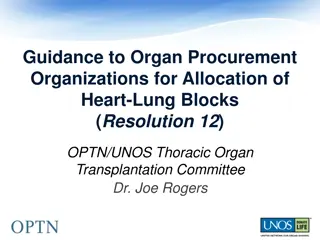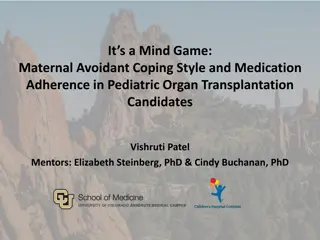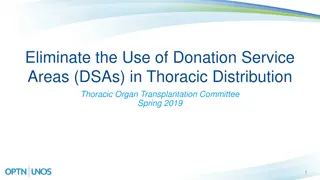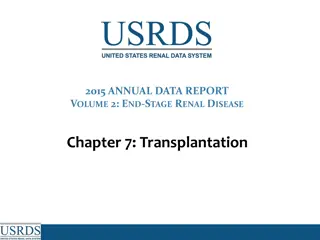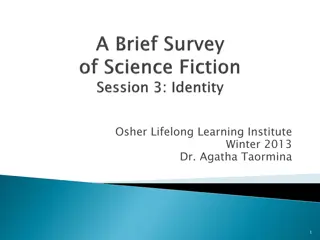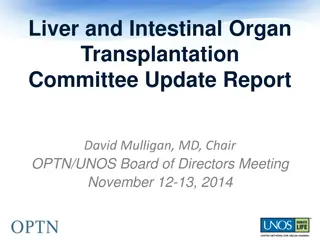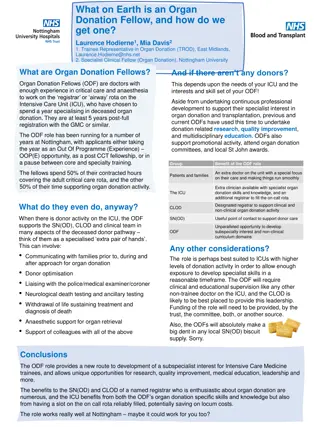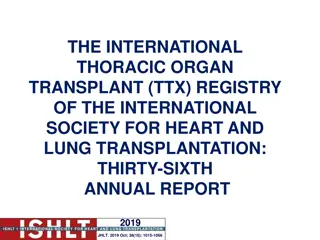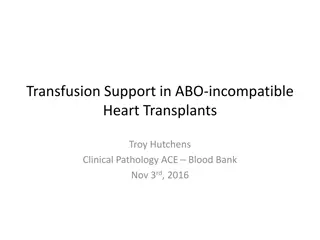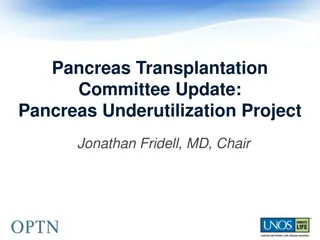Ethical Issues in Organ Transplants
Organ transplantation involves the moving of organs from one body to another to replace damaged or absent organs. The process includes cadaveric and living organ donations, with various transplantable organs like lungs, kidneys, heart, and more. There are ethical issues surrounding organ donation decisions that require informed choices to be made by donors.
Download Presentation

Please find below an Image/Link to download the presentation.
The content on the website is provided AS IS for your information and personal use only. It may not be sold, licensed, or shared on other websites without obtaining consent from the author.If you encounter any issues during the download, it is possible that the publisher has removed the file from their server.
You are allowed to download the files provided on this website for personal or commercial use, subject to the condition that they are used lawfully. All files are the property of their respective owners.
The content on the website is provided AS IS for your information and personal use only. It may not be sold, licensed, or shared on other websites without obtaining consent from the author.
E N D
Presentation Transcript
ETHICAL ISSUES INVOLVED IN ORGAN TRANSPLANTS
DEFINITION: Organ transplantation is the moving of an organ from one body to another or from a donor site to another location in the person's own body, to replace the recipient's damaged or absent organ. The donated organ may be from a deceased donor, a living donor, or an animal. In some cases an artificial organ is used. Organ donors may be living, brain dead, or dead via circulatory death. Tissue may be recovered from donors who die of circulatory death, as well as of brain death up to 24 hours past the cessation of heartbeat.
INTRODUCTION An organ transplant is a surgical operation in which the damaged organ in the human body is removed and replaced with a functioning one. Cadaveric organ donation involves removing organs from a recently deceased donor. Living organ donation involves the donation of one of a paired organ (such as kidneys) or a portion of an organ (such as a lobe of the liver or lung). The donor's organ system is still able to function after the donation.
Which transplanted? Solid transplantable organs: Lungs Kidney Pancreas Heart Intestine Thymus Liver organs can be Other organs Gall bladder Stomach Eyes, ear, nose, skin
The critical donation pathway Donation after brain death Severe brain damage Donor Identify potential donor Diagnose brain death Refer potential donor Approach to family Maintain viability of organs Retrieve organs Provide feedback detection referral Donor Familycommunication Donor maintainance Organ retrieval
PROCESS Organ Transplantation Process Organ Transplantation process Steps getting the Transplant waiting list for on How organs are matched i- e blood type After the transplant (eating & exercise) Planning your finances Contacting your donar family Organ
ETHICAL ISSUES REGARDING THE DONOR A problem or situation that requires a person or organization to choose between alternatives that must be evaluated as right (ethical) or wrong (unethical). The decision whether or not to donate organs and/or tissues for transplantation is an ethical (or moral ) decision. The discussion here aims to ensure that whatever decision the person makes, whether to donate or not to donate, that decision will be a well-informed one
ISSUES Why think about the ethics of donating organs after death? The procedures involved Brain death What happens to the organs and tissues? How will the outwards? What actually happens? family feel Reasons why some Decide and others decide not to donate organs after death. Making a decision when the relative has died
DONATION AFTER DEATH Organ and tissue donation involves making a decision about how someone s body is to be treated after death. Organ and tissue donation may be seen as one of the last acts of the person who donates. It is a decision about how that person wanted to live his or her life and be remembered in death. It is also an ethical decision because it is intended to benefit others, the recipients of organs or tissues by transplantation Organ and tissue donation is a decision which will affect those who are left behind after someone has died. Since the issue of organ donation often arises after a sudden and traumatic death, the feelings of the bereaved family are very important.
LIVING ORGAN DONATION Benefits: The donation can be pre-arranged, allowing the patient to begin taking antirejection drugs in advance, thereby increasing the chances of success There are often better matches between donors and recipients with living donation, because many donors are genetically related to the recipient Psychological benefits for both the donors and recipients
DRAWBACKS Health consequences: Pain, discomfort, infection, bleeding and potential future health complications are all possible Psychological consequences: Family pressure, guilt or resentment Pressure: Family members may feel pressured to donate when they have a sick family member or loved one
ETHICAL ISSUES REGARDING THE RCIPIENT A competent person who could benefit from receiving a transplant should be informed regarding the benefits, risks, burdens and costs of the transplant and aftercare. No unfair influence should be put on someone to be a transplant recipient. Recipients and their families can be tempted to pressure, blackmail or bribe a potential living donor to donate or a health care professional to give them a privileged position on the waiting list. Such practices are unethical because they fail to respect the freedom of the donor or they violate other potential recipients' rights regarding access.
ETHICAL ISSUES REGARDING THE ALLOCATION OF LIMITED RESOURCES 1. Criteria for Selection Human organs demand usually exceed. Ethical questions regarding efficiency and fairness arise as to how best to distribute these limited resources. On what basis should this person rather than that person be chosen to receive a given organ? Who should choose? These decisions are serious as they can involve who will live and who will die. A widely used and approved criteria of selection is to give priority to those who have great need and who are expected to benefit greatly.
2. Artificial Substitutes for Organs The shortage of various human parts for transplant purposes has also in motivated research in the development of artificial and synthetic substitutes for tissues and organs. Artificial replacement technologies are generally very costly to develop. If they prove to be successful and are mass produced, their long-term costs can be significantly reduced. A number of routinely used replacement technologies such as long-term renal dialysis, however, remain expensive.
3. USING ANIMALS pancreases, and pig heart valves, are already "accepted" medical treatments. The use of animal parts such as insulin extracted from animal Some argue that the transplants between species does not justify such experiments which so far do not offer hope of therapeutic benefit to the human recipients. Defenders of such experiments argue that they can be justified if no other alternatives are available and for the knowledge gained. Some have questioned whether such transplants involve irresponsible meddling with nature. Various animal rights groups have protested the sacrifice of animals involved in this and other research, which uses them as "mere means" to human welfare.
